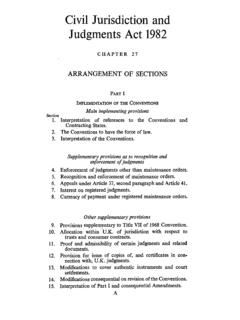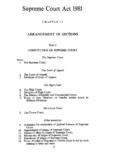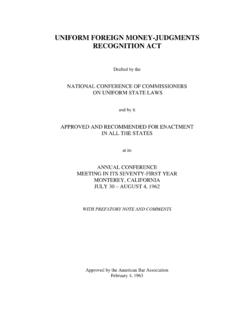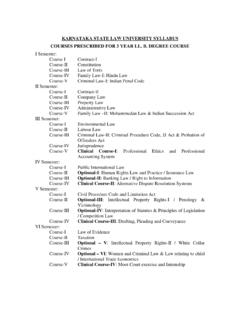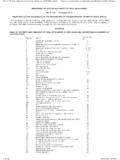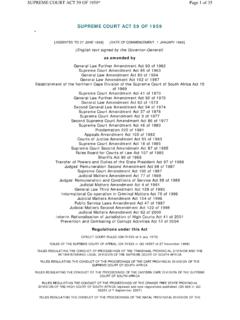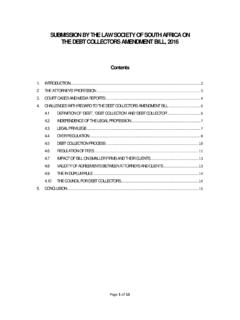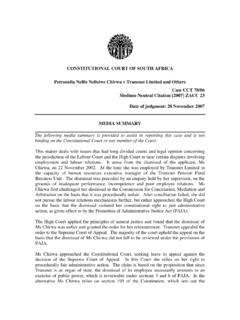Transcription of Judicial Review of Decisions: The Statement of …
1 Judicial Review of Decisions: The Statement of ReasonsPaper by:Matt BlackBarrister-at-LawPresented by:Matthew TaylorBarrister-at-LawA seminar paper prepared for Legalwise: The Decision Making and Reason Writing Process8 March 2016 Updated 6 August 2016 Judicial Review of DecisionsThe Statement of ReasonsPaper by Matt Black, Barrister-at-LawPresented by Matthew Taylor, paper has been drafted for the purposes of a seminar designed to assist administrative decision-makers to produce decisions that are fair, appropriate and clearly articulated with evidence. The focus of the seminar is on the decision making process. law and practice contain various measures that promote (whether by design or otherwise) open and accountable governance and decision-making. At a practical level, one of the implications of this is that the work of administrative decision-makers may be reviewed and (literally) judged by a Court through the process of Judicial Review .
2 Paper attempts to provide a conceptual outline of Judicial Review generally, as well as some of the Judicial Review principles that may be of interest to those who make the decisions that become the subject of Review . Judicial Review decisions made by government agencies and departments are generally subject to Review by the Courts. This process of Judicial Review is limited to the legality of the decision, rather than its merits. As explained in Attorney-General (NSW) v Quin (1990) 170 CLR 1 by Brennan J:The duty and jurisdiction of the court to Review administrative action do not go beyond the declaration and enforcing of the law which determines the limits and governs the exercise of the repository's power. If, in so doing, the court avoids administrative injustice or error, so be it; but the court has no jurisdiction simply to cure administrative injustice or error. The merits of administrative action, to the extent that they can be distinguished from legality, are for the repository of the relevant power and, subject to political control, for the repository alone.
3 , in Judicial Review proceedings, errors of fact and matters of discretion are not (with few exceptions) allowable grounds of Review . Judicial Review is not concerned with the 'merits' of the decision, but is rather directed towards questions of law, or the various points of law and procedure appearing within the available grounds of Review in the Queensland and Commonwealth Judicial Review an application for Judicial Review is made, it is almost always necessary to first pursue any available avenue of merits Review (or other appeal). Under the Queensland legislation , if the applicant has not pursued an alternative Review that is available the Court must dismiss the application if it is satisfied, having regard to the interests of justice, that it should do so .2 The Commonwealth legislation provides that the Court may, in its discretion, refuse to grant 1 Judicial Review Act 1991 (Qld) (the JR Act) and Administrative Decisions ( Judicial Review ) Act 1977 (Cth) (the ADJR Act).
4 2JR Act, s 13. Compare Freier v Jordan and State of Queensland [2002] QSC BlackJudicial Review of Decisions Statement of Reasons (updated 6 Aug 2016)2an application if adequate provision is made for an alternative Of course, in appropriate cases, there may be exceptions to this order to be reviewable under the Judicial Review legislation , a decision must generally be of an administrative character made .. under an enactment .5 The test for whether a decision is one that is made under an enactment was stated by the High Court as follows:6 The determination of whether a decision is made .. under an enactment involves two criteria: first, the decision must be expressly or impliedly required or authorised by the enactment; and, secondly, the decision must itself confer, alter or otherwise affect legal rights or obligations, and in that sense the decision must derive from the enactment. A decision will only be made .. under an enactment if both these criteria are met.
5 Of the examples cited by the High Court was a case involving a decision to issue a search warrant. That decision was said to affect legal rights or obligations because it provided the police officers executing the warrant with authority to do acts which would otherwise amount to Australian Broadcasting Tribunal v Bond (1990) 170 CLR 321, Mason CJ pointed out that a reviewable decision for the purposes of the Judicial Review legislation is one for which provision is made by or under a statute (at 337). His Honour explained (at 337):That will generally, but not always, entail a decision which is final or operative and determinative, at least in a practical sense, of the issue of fact falling for consideration. A conclusion reached as a step along the way in a course of reasoning leading to an ultimate decision would not ordinarily amount to a reviewable decision, unless the statute provided for the making of a finding or ruling on that point so that the decision, though an intermediate decision, might accurately be described as a decision under an Judicial Review legislation sets out the grounds of Review that are available when challenging an administrative decision.
6 Some of the more commonly relied upon grounds include:7(a)Breaches of the rules of natural justice or procedural fairness.(b)Failure to observe necessary procedures.(c)Taking into account irrelevant considerations, or overlooking relevant considerations.(d)Legal unreasonableness.(e)Errors of Act, s 10(2)(b). Compare Heslop v Secretary, Department of Families, Housing, Community Services & Indigenous Affairs [2010] FCA Hagedorn v Department of Social Security (1996) 44 ALD 274, 281. Judicial Review prior to the completion of merits Review might, for example, be appropriate where the decision-maker is intending to apply a particular legal test which the applicant contends is erroneous. 5JR Act, s 4; ADJR Act, s 3. Other decisions may nevertheless be reviewable in the Courts' inherent jurisdiction, or (in the Commonwealth sphere) under the Judiciary Act University v Tang (2005) 221 CLR 99, [89].7 See JR Act, ss 20, 23; ADJR Act, s BlackJudicial Review of Decisions Statement of Reasons (updated 6 Aug 2016) the time a party receives an adverse decision, it will often be the case that a significant volume of documentation will have accumulated.
7 That might include evidence obtained by the party themselves, evidence obtained by other parties (or by the decision-maker), and the correspondence or submissions that have been put to the decision-maker. However, from the perspective of the party who receives an adverse decision, perhaps the most critical document is the decision-maker's Statement of reasons. is no general or common law duty for a decision-maker to give reasons for a However, many statutory schemes require the giving of a Statement of reasons and, in any event, the Judicial Review legislation enables an aggrieved party to call upon the decision-maker to give a Statement of As will be discussed further, that Statement of reasons will often become the 'centrepiece' of any Judicial Review proceedings. Why and which decisions are challenged through Judicial decisions are likely to be challenged through Judicial Review , and why? Perhaps the simple answer is: the decisions likely to be challenged are the ones that are adverse to the party involved.
8 And, that is probably the reason why they are challenged as well! more complete answer to the question is that there are certain features of an administrative decision which tend to make it more or less likely that it will be subject to Judicial Review . Some of those features include:(a)The availability of other avenues of Review . As noted above, one of the general principles of Judicial Review is that, if there are other avenues of Review available, those avenues should be pursued before applying to a Court for Judicial Review . So, where there are no (or limited) rights of merits Review or statutory appeal, a decision is more likely to be the subject of Judicial (b)The nature of the decision. Judicial Review proceedings can be expensive to litigate. Rationality would suggest that decisions with low financial stakes will tend to be the subject of Judicial Review to a lesser extent than decisions with significant financial stakes. Decisions that involve a person s liberty11 or right to reside in Australia12 will tend to be subject to more Judicial Review , because the financial risks will often be less of a concern to the affected party.
9 (c)The issues involved in the decision. If the facts are largely uncontroversial, but there is a novel point of law or a disputed interpretation of the law, this will tend to make the decision more susceptible to Judicial Review . A party may have an interest in challenging the decision-maker's interpretation of the law, even if the benefits of doing so are not 8 See Minister for Immigration and Ethnic Affairs v Taveli (1990) 23 FCR Act, s 33; ADJR Act, s few examples from the Queensland jurisdiction include parole and corrections decisions, police management decisions, and various public service decisions. 11As at 8 March 2016, all 5 of the Supreme Court's published Judicial Review judgments for 2016 were brought by prisoners (2 of the 5 were successful).12 There are continuing high numbers of Judicial Review cases in the migration area, as revealed by a glance at the published decisions of the Federal Circuit Court between January and March , Calanca v The Queensland Parole Board [2016] QSC BlackJudicial Review of Decisions Statement of Reasons (updated 6 Aug 2016)4(d)The quality of the decision-making process, and the reasons for the decision.
10 This is perhaps a more anecdotal suggestion, but experience suggests that parties who feel they were not treated fairly during the decision-making process or who are not satisfied with the stated reasons for the decision tend to be more inclined to seek Review of the decision. On the other hand, a well-reasoned decision may dissuade a party from seeking Judicial Review because of the difficulty of establishing reviewable simply, and perhaps unsurprisingly, decisions that are open to merits Review and that have modest financial stakes will not commonly be subjected to Judicial Review . On the other hand, decisions that represent the final decision on the merits and which involve significant financial or other stakes will be more likely to be subject to Judicial Review . Distinction between 'decision' and 'reasons' is an important distinction between a decision, and the reasons for that The reasons for decision are not themselves the decision.
